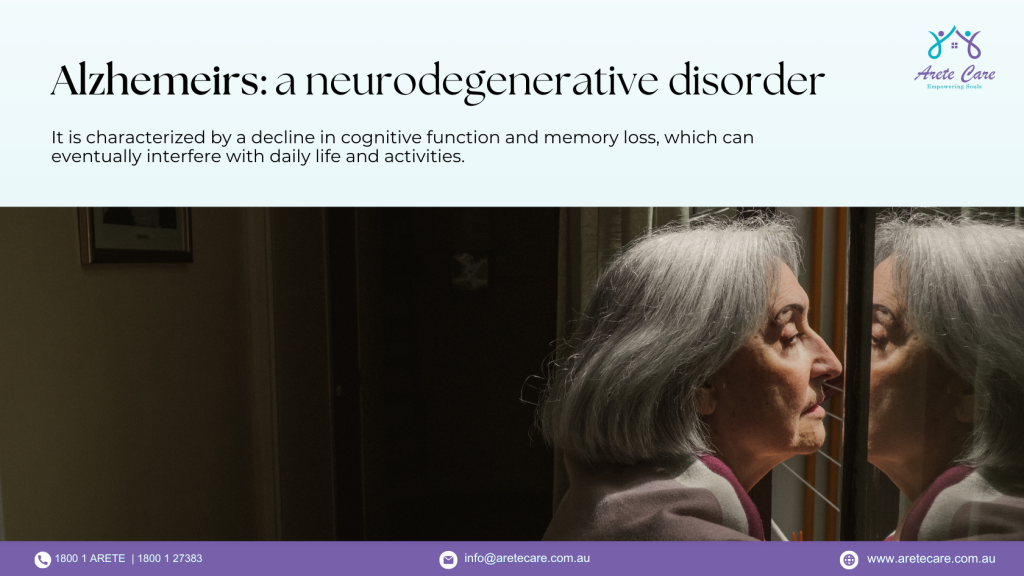Dementia Care at Arete Care
Compassionate and Comprehensive Dementia Care Services
At Arete Care, we understand the challenges that come with a dementia diagnosis. Our team is dedicated to providing compassionate, person-centred care to help individuals and their families navigate this journey with dignity and respect.
Understanding Dementia
Dementia is a complex condition that affects memory, thinking, and behaviour. It’s more than just occasional forgetfulness; it significantly impacts daily life and requires specialised care. Our mission is to offer support, understanding, and professional care tailored to the unique needs of each individual.
Types of Dementia
1. Alzheimer’s Disease
- The most common form of dementia, accounting for 60-80% of cases.
- Symptoms: Memory loss, confusion, difficulty with language, and changes in behaviour.
2. Vascular Dementia
- Caused by reduced blood flow to the brain, often after a stroke.
- Symptoms: Problems with planning, judgement, and movement, often occurring suddenly.
3. Lewy Body Dementia
- Characterised by abnormal protein deposits in the brain.
- Symptoms: Visual hallucinations, movement disorders, and cognitive fluctuations.
4. Frontotemporal Dementia
- Affects the frontal and temporal lobes of the brain.
- Symptoms: Changes in personality, behaviour, and language.
Common Symptoms
Dementia symptoms can vary widely but generally include:
- Memory Loss: Forgetting recent events or important dates.
- Difficulty Communicating: Struggling to find the right words or follow conversations.
- Disorientation: Getting lost in familiar places or not knowing the time or date.
- Changes in Mood and Behavior: Increased anxiety, depression, or agitation.
- Difficulty with Complex Tasks: Trouble with planning, problem-solving, or managing finances.
Causes and Risk Factors
While the exact cause of dementia is not fully understood, several factors contribute to its development:
Age: Risk increases significantly with age, particularly after 65.
Genetics: Family history can play a role, especially in certain types of dementia.
Health Conditions: Conditions like cardiovascular disease, diabetes, and high blood pressure can increase the risk.
Lifestyle Factors: Poor diet, lack of physical activity, and smoking can contribute to cognitive decline.
Diagnosis and Treatment
Diagnosing dementia involves a comprehensive medical assessment, including:
Medical History: Reviewing symptoms and family history.
Physical Examination: Checking overall health and neurological function.
Cognitive Tests: Assessing memory, problem-solving, and other cognitive abilities.
Brain Imaging: Using MRI or CT scans to identify changes in the brain.
While there is no cure for dementia, treatments are available to manage symptoms and improve quality of life:
Medications: Drugs to manage symptoms and slow progression.
Therapies: Cognitive therapy, physical therapy, and occupational therapy.
Lifestyle Changes: Healthy diet, regular exercise, and mental stimulation
Living with Dementia
Living with dementia poses significant challenges, but with the right support, individuals can maintain a good quality of life. Key strategies include:
- Creating a Safe Environment: Adapting the home to reduce risks and ensure safety.
- Routine and Structure: Establishing daily routines to provide consistency and reduce confusion.
- Engaging Activities: Encouraging participation in meaningful and enjoyable activities.
- Support Networks: Building a strong support system of family, friends, and professionals.
NDIS and Dementia Support
- Eligibility and Assessment:
- People with dementia can apply for NDIS support if they are under 65 years old when they first apply.
- The NDIS will assess the impact of dementia on the individual’s ability to perform daily activities and their level of support needs.
- Individualised Plans:
- Once deemed eligible, an individualised NDIS plan is created. This plan outlines the support and services required to help the individual live as independently as possible.
- The plan can include funding for various supports such as personal care, therapy, and assistive technology.
- Types of Support:
- Personal Care Assistance: Help with daily living activities like bathing, dressing, and eating.
- Therapeutic Support: Access to services like occupational therapy, physiotherapy, and speech therapy to maintain functional abilities.
- Assistive Technology: Devices and equipment that assist with mobility, communication, and daily tasks.
- Home Modifications: Changes to the home environment to improve safety and accessibility.
- Respite Care: Temporary care to provide relief for primary caregivers.
- Community Participation: Programs and activities that help individuals stay engaged and active in their community.
- Support Coordination:
- NDIS may fund a support coordinator to help navigate the services and ensure the individual is accessing the appropriate supports.
- Review and Adjustment:
- NDIS plans are reviewed regularly to ensure they continue to meet the changing needs of the person with dementia.
Steps to Access NDIS Support for Dementia
- Initial Contact:
- Contact the NDIS either through their website or by phone to start the application process.
- Gather Documentation:
- Collect medical evidence, including a diagnosis of dementia and reports detailing how it affects daily life.
- Complete Application:
- Submit the application along with the supporting documentation.
- NDIS Planning Meeting:
- Attend a planning meeting to discuss support needs and develop the individualised plan.
- Implement Plan:
- Once the plan is approved, start accessing the funded supports and services.
Additional Resources
- NDIS Website: NDIS Official Site
- Dementia Australia: Provides resources and support for individuals with dementia and their families. Dementia Australia


